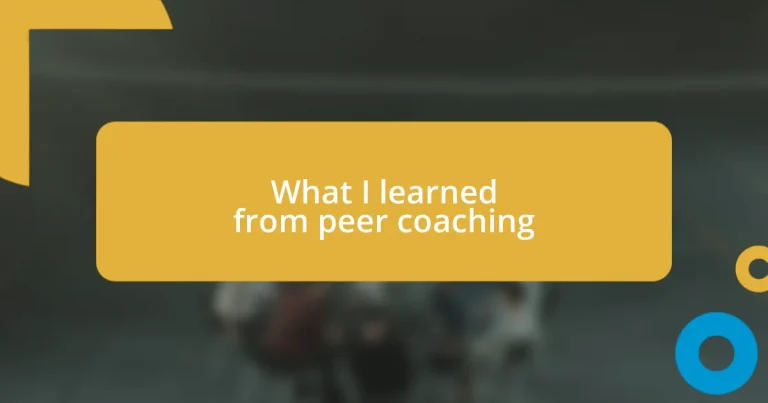Key takeaways:
- Peer coaching fosters collaboration and shared vulnerability, creating a non-judgmental environment that enhances personal and professional growth.
- Key techniques like active listening, goal setting, and role-playing significantly improve the effectiveness of peer coaching and promote deeper understanding.
- Success in peer coaching is often measured by personal growth and improved confidence, rather than just quantifiable metrics, emphasizing the transformative nature of the experience.
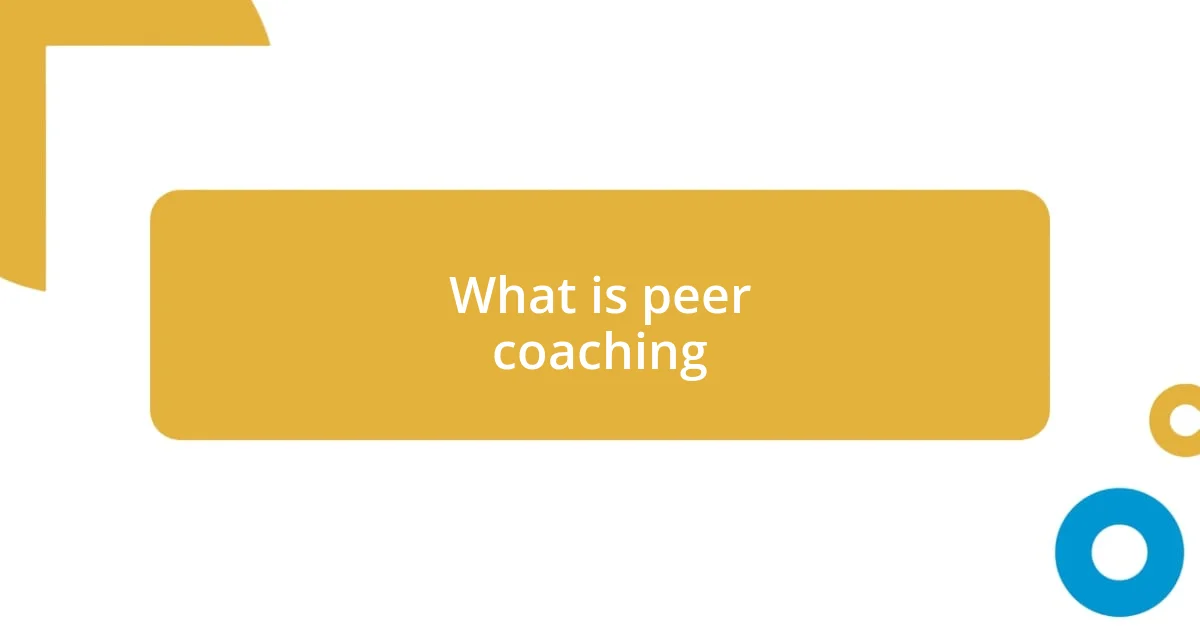
What is peer coaching
Peer coaching is essentially a collaborative process where individuals support each other in their personal and professional growth. I remember my first experience with peer coaching, sitting across from a colleague I barely knew. It felt a bit awkward at first, but as we shared our challenges, I quickly realized that this camaraderie was enriching our learning journeys in unexpected ways.
In its core, peer coaching fosters a non-judgmental space to explore ideas, reflect on practices, and encourage developmental feedback. Isn’t it fascinating how simply sharing successes and setbacks with someone can provide fresh perspectives? I often left our sessions feeling inspired, and I believe that’s the magic of peer coaching—it’s the synergy of collaboration that ignites our passions and propels us forward.
Moreover, peer coaching stands out because it eliminates the hierarchy often found in traditional mentoring. I felt more comfortable discussing my struggles with someone who was in the trenches beside me. This shared vulnerability created a supportive atmosphere where I could explore new strategies and consider different approaches without fear of judgment. Have you ever had that moment when you realized that vulnerability can actually lead to growth? That’s the beauty of peer coaching!
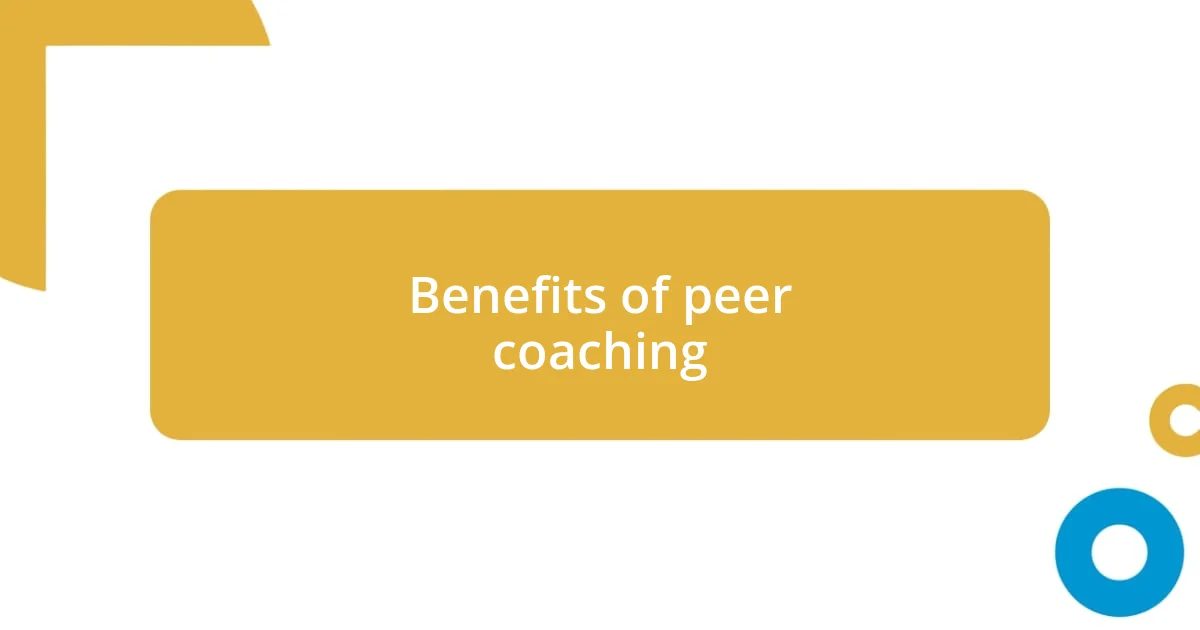
Benefits of peer coaching
When engaging in peer coaching, I noticed several profound benefits that significantly enhanced my learning experience. One of the most striking advantages is the sense of accountability that naturally arises. I found that knowing someone else was invested in my progress motivated me to push through challenges I might have otherwise sidestepped. It’s like having a workout buddy; you’re less likely to skip that training session when someone else is counting on you.
Additionally, peer coaching cultivates a rich exchange of ideas. Time after time, I walked away with fresh strategies I hadn’t considered before. I remember one particular session where a colleague shared a technique for problem-solving that was so much simpler than my usual method. Not only did I implement it, but it also opened the door to more creative thinking in my work.
Here’s a quick look at some of the key benefits of peer coaching:
- Shared accountability: Encourages commitment and persistence in achieving personal goals.
- Diverse perspectives: Different backgrounds and experiences provide a wealth of knowledge that enriches understanding.
- Stronger relationships: Fosters trust and camaraderie, making it easier to discuss challenges.
- Self-reflection: Promotes a deeper understanding of one’s strengths and areas for growth through feedback.
- Practical skills enhancement: Often leads to real-time problem-solving and skill development through practical demonstrations.
Reflecting on these benefits, I truly believe that peer coaching is not just an educational tool; it’s a transformative experience that provides a supportive network, ultimately making the learning journey more fulfilling.
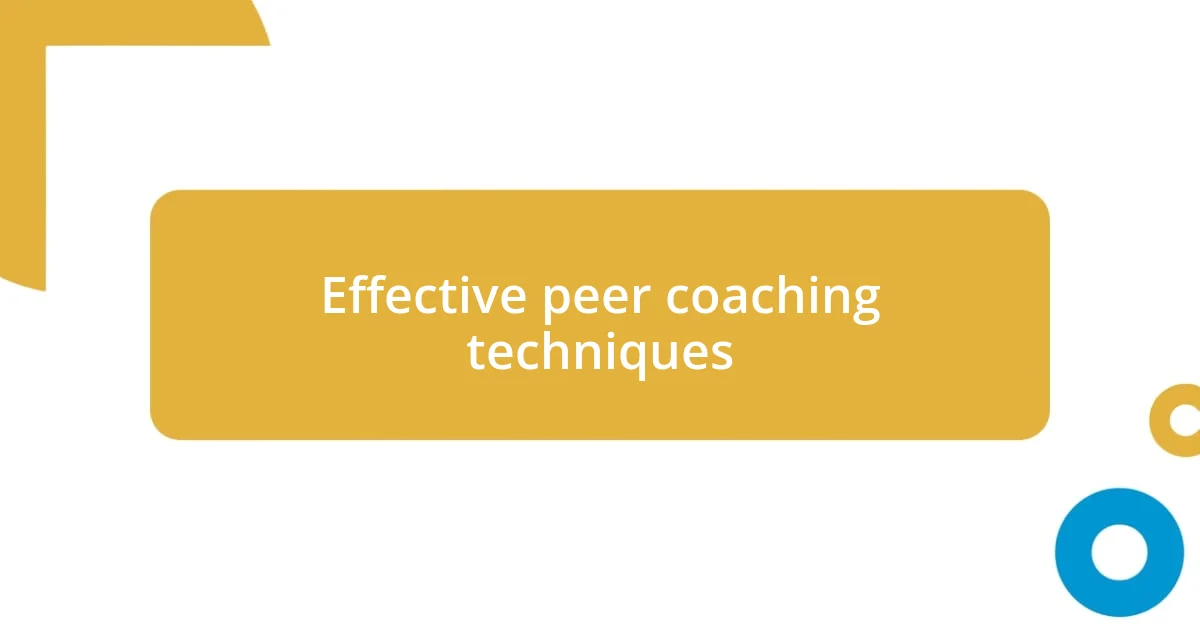
Effective peer coaching techniques
Effective peer coaching relies heavily on specific techniques that enhance the experience for both participants. One approach I’ve found particularly effective is active listening. In one of my sessions, I noticed how powerful it was when my peer maintained eye contact and provided feedback that truly reflected my thoughts. Simply feeling heard transformed my hesitations into a meaningful dialogue, allowing me to delve deeper into my challenges.
Another technique that has proven invaluable is goal setting. During a coaching session, my partner and I established clear, achievable objectives. This structured approach provided a roadmap for our future conversations and helped me stay focused. I often think about how energizing it feels to track progress toward those lived goals together. It creates a sense of shared achievement that I didn’t expect but appreciate tremendously.
Lastly, role-playing scenarios can be a game changer in peer coaching. When my colleague suggested we act out a difficult conversation, I was hesitant at first, but the experiences that unfolded were eye-opening. I gained new perspectives on handling challenging situations and left those sessions with practical tools to apply in real life — precisely the kind of transformation I cherish.
| Technique | Description |
|---|---|
| Active Listening | A technique focused on fully understanding and engaging with what the other person is saying. |
| Goal Setting | Establishing clear objectives to guide the coaching sessions effectively. |
| Role-Playing | Simulating real-life scenarios to practice skills and gain new insights. |
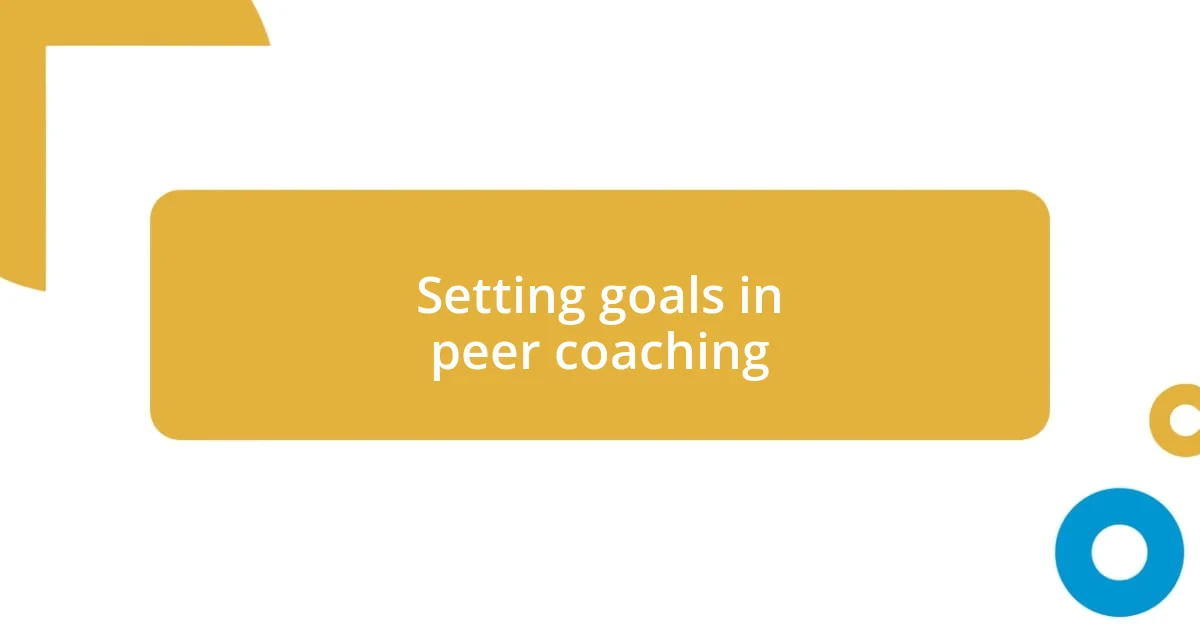
Setting goals in peer coaching
When it comes to setting goals in peer coaching, I’ve learned that specificity is key. In one of my early sessions, I set a broad goal to “improve my communication skills.” However, it wasn’t until I narrowed it down to “mastering feedback techniques in one-on-one settings” that I truly saw progress. Isn’t it fascinating how having a clear target can keep you focused?
Another aspect I’ve come to appreciate is the power of shared goals. One of my peers and I decided to tackle time management together. By aligning our targets—each week focusing on different strategies—it transformed our sessions into a collaborative adventure. I remember the excitement we both felt when one of us shared a time-blocking technique that practically doubled our productivity. It felt like we were solving a mystery together!
Moreover, revisiting and adjusting goals regularly has made a significant impact. During one session, we realized that our initial goals no longer resonated with our evolving needs. By discussing our experiences, we both reshaped our objectives to reflect our current challenges. I find myself wondering, how often do we stick to a plan that no longer serves us? Being flexible in our goal-setting kept us motivated and engaged, turning our coaching experience into a journey of continuous growth.
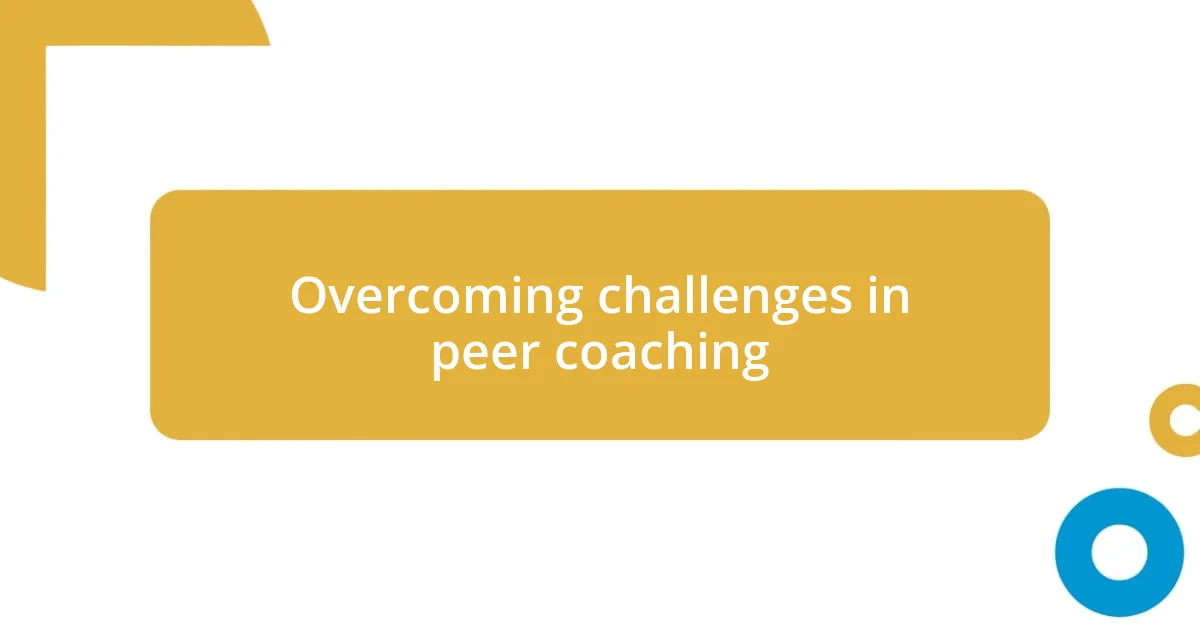
Overcoming challenges in peer coaching
Navigating the challenges of peer coaching can feel daunting, especially when the dynamics between partners shift. I remember a session where my coachee seemed distant, and I sensed a barrier had formed. It struck me that creating a safe space is essential. By acknowledging the discomfort and discussing it openly, we transformed that awkward moment into a breakthrough, proving how vulnerability can foster understanding.
Another hurdle I’ve faced is confronting differing communication styles. I once partnered with someone whose direct feedback initially felt harsh. At first, I questioned whether our coaching relationship would thrive. However, I realized that embracing those differences and cultivating patience turned out to be incredibly beneficial. It forced me to adapt, allowing us to refine our interactions until they harmonized, resulting in deeper learning for both of us.
Sometimes, the schedule clashes can be a real blocker. I once had to navigate a particularly busy few weeks, which threatened to unravel the consistency we had worked hard to establish. I suggested that we check in via short voice messages during our hectic days. This small adjustment embraced the chaos and kept our momentum alive, demonstrating that flexibility can be the key to overcoming barriers that might otherwise derail progress. Reflecting on these experiences, I can’t help but ask: How often do we let seemingly insurmountable challenges dictate the terms of our growth?
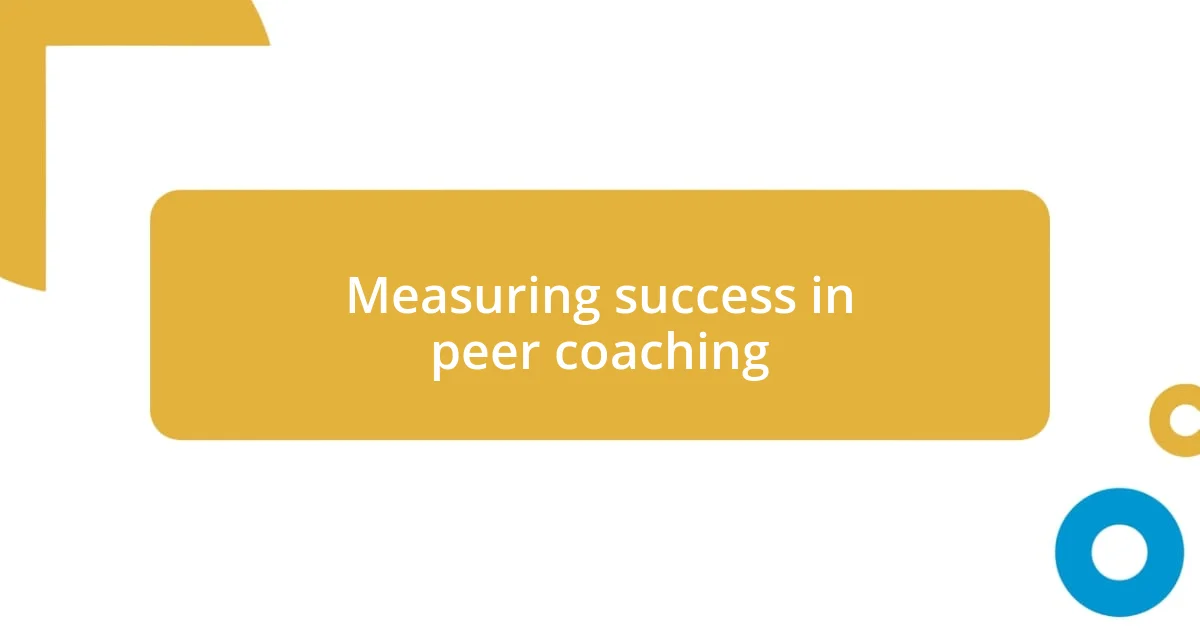
Measuring success in peer coaching
Measuring success in peer coaching often goes beyond quantifiable achievements. For instance, I recall a particular period when my coachee and I both felt a marked improvement in our confidence levels. While we didn’t track specific metrics, like how many tasks we completed, the transformation in our self-assurance during interactions felt like a milestone in itself. Isn’t it intriguing how some victories are felt much deeper than they appear on paper?
Feedback sessions turned out to be another invaluable tool for assessing our progress. I remember setting aside time after each meeting to reflect on what worked well and what didn’t. Sharing these insights fostered a sense of accountability. It wasn’t just about celebrating successes; acknowledging the areas needing improvement made me realize how truly collaborative peer coaching can be. How often do we take the time to genuinely reflect on our journeys?
Lastly, I learned that personal growth, though harder to measure, is often the best indicator of success. After months of collaborating with my peer, I felt more adept at navigating complex conversations and embracing constructive criticism. The sense of satisfaction that came from those moments was unbeatable. Isn’t it powerful to think that sometimes, success feels more like a journey within ourselves rather than a checklist to tick off?












